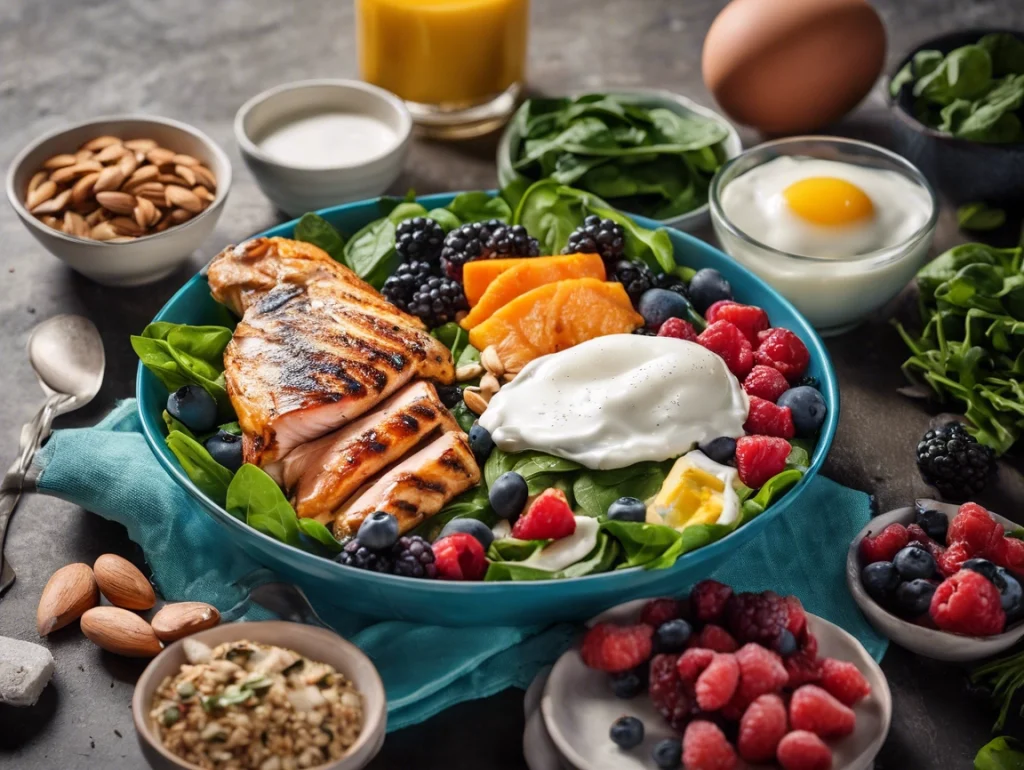Recovery plays a crucial role in muscle building. After intense workouts, your muscles need time to repair and grow stronger. The more intense your workout, the more recovery time you’ll need. Exercises like heavy compound lifts (squats, deadlifts) are more demanding on your muscles and nervous system, requiring more recovery than isolation exercises (like bicep curls). Additionally, workout intensity, volume, and individual muscle groups affect the needed rest. But recovery is not just about rest—your diet is a powerful tool in speeding up the process. Here’s a look at what foods increase recovery and how the nutrients in these foods help your body repair and grow muscle.
How Do Nutrients Support Recovery?
Before diving into specific foods, it’s important to understand the role nutrients play in recovery. The key nutrients involved are:
- Protein: Provides the building blocks (amino acids) for muscle repair.
- Carbohydrates: Restore glycogen levels, the fuel your muscles use during exercise.
- Antioxidants: Reduce inflammation and oxidative stress that occurs after intense exercise.
- Omega-3 Fatty Acids: Reduce muscle soreness and inflammation.
- Vitamins & Minerals: Support various recovery processes, such as immune function and collagen synthesis.
What Foods Increase Recovery?
1. Lean Protein Sources
Foods like chicken breast, turkey, lean beef, and fish are rich in high-quality protein, which is essential for repairing and rebuilding muscle fibers damaged during exercise. Protein also stimulates muscle protein synthesis, helping your muscles grow stronger.
- Nutrient Highlight: Protein contains essential amino acids like leucine, which activate the mTOR pathway and lead to muscle growth.
- Example: Grilled chicken breast (31g protein per 100g).
2. Salmon
Salmon is an excellent source of omega-3 fatty acids, which have powerful anti-inflammatory properties. Muscle inflammation after intense exercise is common. Omega-3s can reduce this inflammation, speeding up recovery and reducing muscle soreness.
- Nutrient Highlight: Omega-3 fatty acids help reduce delayed onset muscle soreness (DOMS) by lowering levels of pro-inflammatory cytokines.
- Example: 3 oz of salmon provides 1,500 mg of omega-3 fatty acids.
3. Eggs
Eggs, particularly the yolks, provide vitamin D and choline, which support overall muscle recovery. Vitamin D is crucial for muscle function and immune support, while choline plays a role in muscle contraction.
- Nutrient Highlight: The leucine content in eggs promotes protein synthesis.
- Example: One large egg contains 6g of protein and essential recovery nutrients.
4. Sweet Potatoes
Your body’s glycogen stores are depleted after a workout. Sweet potatoes are a rich source of complex carbohydrates, replenishing muscle glycogen levels and ensuring you have enough energy for your next workout.
- Nutrient Highlight: Sweet potatoes are high in vitamins A and C, which boost immune function and reduce oxidative stress.
- Example: One medium sweet potato has about 26g of carbohydrates and plenty of vitamins.
5. Greek Yogurt
Rich in protein and carbohydrates, Greek yogurt is an ideal post-workout food. Combining fast-digesting whey protein and slower-digesting casein protein ensures immediate and sustained muscle repair.
- Nutrient Highlight: Greek yogurt contains calcium, aiding muscle contractions and recovery.
- Example: A 6 oz serving provides about 10g of protein and 15g of carbohydrates.
6. Spinach
Dark leafy greens like spinach contain antioxidants, including vitamins C and E, which help reduce oxidative stress and inflammation post-workout. Spinach also provides iron, essential for oxygen transport to recover muscles.
- Nutrient Highlight: Vitamin C helps repair connective tissues like tendons and ligaments.
- Example: One cup of spinach contains around 24 mg of calcium and antioxidants.
7. Berries
Blueberries, raspberries, and strawberries are rich in antioxidants like anthocyanins, which protect muscles from oxidative damage and speed up the healing process. They are a great addition to your post-workout meal.
- Nutrient Highlight: Anthocyanins reduce inflammation and help repair muscle tissue damaged during exercise.
- Example: A cup of blueberries offers 24% of your recommended vitamin C intake.
8. Quinoa
Quinoa is a complete protein containing all nine essential amino acids your body needs to repair and build muscle. It’s also rich in magnesium, which helps reduce muscle cramps and tension.
- Nutrient Highlight: Magnesium supports proper muscle contraction and relaxation, reducing the risk of cramping post-workout.
- Example: One cup of cooked quinoa provides 8g of protein and 39g of carbohydrates.
9. Almonds
Almonds provide a healthy dose of vitamin E, a powerful antioxidant that protects cells from damage caused by exercise. The monounsaturated fats in almonds also help reduce inflammation and promote healing.
- Nutrient Highlight: Vitamin E neutralizes free radicals, reducing muscle oxidative stress.
- Example: A handful of almonds (about 23) contains 7.3 mg of vitamin E, around half your daily requirement.
Why Do Some Exercises Require More Recovery Than Others?
Recovery time depends on the type of exercise and the muscle groups involved. Compound lifts, which involve multiple muscle groups (e.g., squats, deadlifts), require longer recovery times because they stress your muscles and your central nervous system more. Isolation exercises, like bicep curls or leg extensions, typically require less recovery because they focus on one muscle group and generate less systemic fatigue. Additionally, factors like workout intensity, volume, and an individual’s fitness level all play a role in determining how much recovery is needed.
Key Takeaways
- Recovery is essential for muscle growth, especially after intense workouts.
- Foods rich in protein, carbohydrates, antioxidants, and omega-3s can significantly enhance your recovery.
- Nutrient-rich foods like salmon, Greek yogurt, spinach, and quinoa support muscle repair, reduce inflammation, and replenish energy stores.



